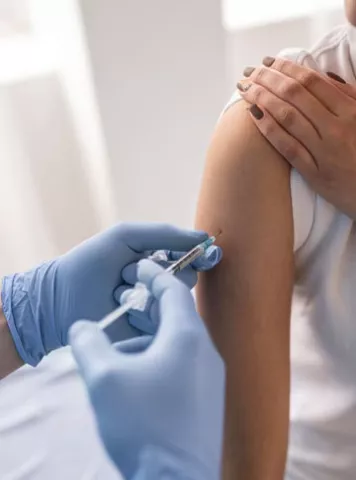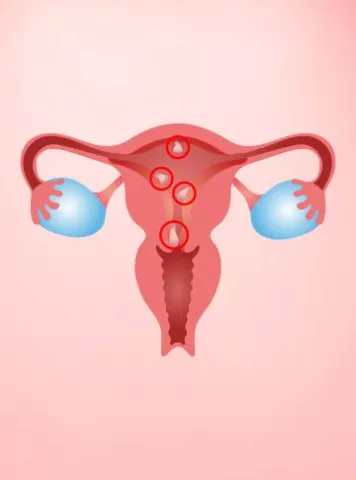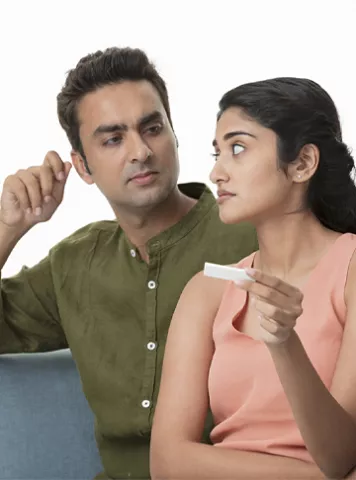Can infertility be cured ? is the most common worrying question that bothers any couple suffering from childlessness. But seemingly there is no longer a point at which an infertile couple must abandon hope. With advanced technology it is now possible for a women to conceive not only during her reproductive age but also after menopause.
Now comes the question, what is infertility…or when should a couple think about seeking medical help?
Infertility is inability to conceive following 12 months of regular intercourse without any contraception. Infertility is of two types – primary and secondary.
Primary infertility – conception has never taken place.
Secondary infertility – At least one previous conception has been documented irrespective of outcome.
Globally most couples suffer from primary infertility. Infertility can affect both men and women of reproductive age worldwide causing considerable personal suffering and disruption of family life.
Why few couples are infertile?
The cause of infertility could either be due to female factor, male factor or combined both male and female factors. And sometimes unexplained infertility where no diagnosis can be made even after standard investigation.
Main events that are necessary for pregnancy to occur are – ovulation, fertilisation and implantation. Disturbance occurring in any of the above could result in infertility.
Let us see what kind of problems in couples lead to infertility and what are the treatment options available for the couples to get a healthy baby.
Female infertility can be caused by a number of factors:
1. Fallopian tubal Disease: After ovulation,eggs travel from ovary to uterus through the fallopian tube.Any disease of tubes can prevent contact between egg and sperm.
Various infections( most commonly STDs), endometriosis, pelvic surgery-surgeries for ovarian cyst or masses, ectopic pregnancy, myomectomy may cause pelvic inflammatory diseases [PID]which can result in damage of fallopian tubes.
2. Ovarian functional disruption / hormonal causes: Synchronised hormonal changes occur during menstrual cycle that lead to release of an egg from the ovary(ovulation) and thickening of the endometrial lining which helps in preparation for the fertilized egg (embryo) to implant inside the uterus. Disruption in ovulation is seen in following conditions-
*Polycystic ovary syndrome (PCOS) : Polycystic ovary syndrome is the common cause of female infertility.In PCOS hormonal imbalance interferes with the process of ovulation.
*Functional hypothalamic amenorrhea: Excessive physical exercise as in athletes or emotional stress may result in amenorrhea (absence of periods).
*Diminished ovarian reserve : In diminished ovarian reserve, women may experience difficulty in conceiving as the number of eggs in ovaries are decreased compared to peers.
*Premature ovarian failure: Ovaries stop working before the age of 40 years which can be natural or can be due to disease, surgery, chemotherapy, or radiation.
3.Uterine causes: Abnormal anatomy of the uterus; the presence of polyps and fibroids may interfere with implantation and sometimes there could be cavity defects like septate uterus. Anomalies like Unicornuate, Bicornuate uterus and Uterus Didelphys also cause infertility.
4. Cervical causes: Few women may suffer from cervical diseases where sperms cannot pass through the cervical canal due to abnormal mucus production or a prior cervical surgical procedure.
Male factors causing infertility:
Low sperm counts, poor sperm quality, or both account for more than 90% of male infertility. The remaining cases can be due to anatomical problems, hormonal imbalances, and genetic defects. Sperm abnormalities include:
1. Oligospermia (low sperm counts) /Azoospermia (no sperms): Sperm count less than 15 million/ml is termed as oligospermia whereas azoospermia refers to the complete absence of sperm in the ejaculate.
2. Asthenospermia (Poor sperm motility): 60% or more sperms have abnormal or reduced motility (movement is slow and not in straight line).
3.Teratospermia (abnormal sperm morphology): sperms should be normal in size and shape for adequate fertility.
Congenital birth defects, diseases (such as mumps), chemical exposure/occupational harms and lifestyle habits/addiction can also cause sperm abnormalities.
Factors that affect the male and female infertility :
*Advanced age.
*Tobacco, alcohol or other drug abuse.
*Environmental/occupational factors.
*Excessive exercise.
*Imbalanced diet associated with extreme weight loss or gain.
Now that we know the causes of infertility, let’s proceed how the health care professionals evaluate the couple and diagnose where the problem could be.
Diagnosis:
As both male and female factors can contribute to infertility, detailed medical history, physical examination and investigations are needed to assess the cause of infertility.
Evaluation of infertility includes following steps:
(a) History taking: Couples with infertility are interviewed to know about important facts with full history taking which includes: trying time; menstrual and obstetric history (in female partner); contraceptive and sexual history; occupation and addiction; family and past history.
(b)Clinical examination: Full clinical examination of both partners is required for detection of any physical problem which includes general examination along with examination of chest, breast, abdomen, and genitalia. It helps the infertility specialist to make a provisional diagnosis following which investigations are
advised to prove the clinical diagnosis and to exclude other close possible causes.
(c) Investigations: Infertile couples are usually advised to start their investigations
*After 12 months of trying to conceive or
*After six months if the female partner is more than 35 years old or
*Immediately if there is an obvious cause for their infertility or sub fertility.
As sperm abnormalities, ovulation dysfunction and fallopian tube obstruction are the major causes of infertility,preliminary investigations should be focused on:
Semen analysis: Done after 72 hours of sexual abstinence and two analyses 3 months apart at the same lab.(Results may be interpreted for its volume, sperm count, motility, and morphology according to the WHO reference values*).
Hormonal assay – Serum AMH,TSH and Prolactin in female partners. FSH, LH, Testosterone, TSH and Prolactin in male partners with abnormal semen analysis and suspected endocrine disorder.
Transvaginal ultrasonography – To assess ovaries,uterus and adnexae (adjoining anatomical parts of the uterus) which gives us an idea about ovarian reserve & abnormality, uterine fibroids, adenomyosis, polyps and endometrial problems.
Evaluation of tubal patency:
*Hysterosalpingography (HSG): It’s a radiological procedure where radioopaque dye is injected into the uterine cavity and X-Ray pictures are taken simultaneously to see the movement of dye into the fallopian tubes. Spilling of dye into the abdominal cavity confirms the patency of the tubes.
*Saline Infusion Sonography (SSG): Ultrasound technique that better characterizes the uterine cavity and endometrium by injecting 5-30 ml of warm sterile saline into the uterus.
Advanced investigations-
*Hysteroscopy – Done for intrauterine space-occupying lesions( like Polyps,synechiae,fibroids) or thin endometrium detected on USG.
*Laparoscopy- Surgical procedure done to visualize abdominal and pelvic organs (uterus, fallopian tubes and ovaries)and to simultaneously correct if any abnormality is detected..
*Chromosomal karyotyping is used for suspected genetic disorders.
*Testicular biopsy: A fine-needle aspiration biopsy to differentiate between obstructive and non-obstructive azoospermia in male.
Management:
Management of infertility ranges from counselling and advice to medications and surgery. Counselling of the couple is the most important aspect in the management of infertility with medical and psychological support. Counselling includes advice for healthy lifestyle measures such as:
Balanced diet.
Addition of fruits,vegetables and whole-grain products. Limiting processed foods and foods with added sugars, eating a diet low in cholesterol and saturated fats. Promote regular exercise.
No smoking (avoid passive smoking).
Limit alcohol intake.
Maintain healthy weight.
Folic acid supplementation in women.
Advice on rubella vaccination if seronegative.
Specific treatment of disease that causes infertility- Treatment is aimed at addressing the cause detected during investigations relating to female or male partner.
Different treatment modalities:
Ovulation induction with timed intercourse: It’s best suitable for patients with
anovulation like PCOS. Here few medications are given so that ovulation takes
place; confirmation of ovulation is done with TVS and advice for intercourse given
around ovulation.
Intrauterine insemination (IUI): IUI is timed to coincide with ovulation, where the man’s sperm is introduced into a woman’s uterus using a catheter to facilitate fertilization. IUI may be used in the following conditions.
*Cervical defects.
*Low sperm counts and low motility.
*Erectile dysfunction in male partner.
*Retrograde ejaculation (a condition in which sperms are deposited into the
bladder instead of going out through the urethra).
* HIV discordant couple.
* Unexplained infertility.
IUI is of two types- Artificial insemination by using husband sperms (H) or by using Donor sperms (D).
In vitro fertilization (IVF): Eggs and sperm are taken and are fertilized outside the body in a laboratory to produce an embryo which is then transferred into the uterus by the infertility specialist where it may implant and develop in a successful pregnancy.
Intracytoplasmic sperm injection (ICSI): Is an advanced procedure in which single sperm is injected into a mature egg, then fertilized egg is cultured further and embryo is formed. Embryo is placed in the uterus. In both IVF and ICSI, daily hormonal injections are given to women for around 10-12 days to obtain more eggs and then oocyte retrieval is done.
Surrogate and gestational carriers – Couple may opt for a surrogate or gestational carrier if the female partner is unable to carry a pregnancy to term.
An embryo that is not biologically related to her is implanted in a gestational carrier. This alternative can be used when a female partner produces healthy eggs but is unable to carry a pregnancy to term due to any reason. Egg or sperm donation can be used in this situation.
Prevention:
Just as the saying goes “Prevention is better than cure” Adopting a healthier lifestyle through simple lifestyle changes may help to improve the chances of fertility which includes :
(a) Obesity is one of the important factors contributing to infertility. Weight management is important in preventing and treating infertility. Overweight or underweight females ovulate less regularly compared to women of a healthy weight. Similarly overweight men are likely to have reduced fertility. Therefore maintain a healthy weight with a healthy diet and exercise.
(b) Eat a balanced diet which should include whole grains, pulses, fresh fruits and vegetables, low fat milk products. Limiting consumption of sugar, alcohol, caffeine, no smoking including passive smoking can have a beneficial impact on a couple’s ability to conceive.
(c) Overall health and menstrual irregularities can be improved by moderate exercise , whereas sometimes excessive exercise can disturb menstrual cycle as seen in competitive athletes practicing intense training sessions.
(d) Making time for some leisure activity or hobby and try to lower stress levels which improves physical and emotional health.
(e) Avoid alcohol consumption and smoking as it can affect fertility.
(f) Practice safe sex – Sexually transmitted infections (STIs), such as Chlamydia and gonorrhea can lead to blockage of fallopian tubes, prostatitis and other problems that reduce fertility.
(g) Age and fertility – It’s completely personal choice of a couple to decide the right time to start a family and have a baby. But, women need to understand that their biological clock is an issue, the older the female partner the more difficulty a couple can face when trying to get pregnant.
(h) Regular sexual activity – helps maintain good sperm quality. To conclude,Infertility can be due to many causes,of which few can be avoided/prevented; while majority of them can be treated with medicines, IUI
and assisted reproductive techniques.
Articles
2023


World AIDS Vaccine Day 2023: Can HIV & AIDS affect fertility or your infant’s health?
World AIDS Vaccine Day is observed every year on the 18th of May to create awa...
2023


Male Infertility Infertility Tips
Hyperspermia: Causes, Symptoms, Diagnosis & Treatment
What is Hyperspermia? Hyperspermia is a condition where an individual produ...


Guide to infertility treatments Infertility Tips
पीआईडी: पेल्विक इनफ्लैमेटरी डिजीज और निःसंतानता
पीआईडी - पेल्विक इनफ्लैमेटरी �...
2022


Infertility Tips Uterine Fibroids
Endometrial Polyps (Uterine Polyps)
What are Endometrial Polyps (Uterine Polyps)? Endometrial polyps, often ref...
2022


Female Infertility Infertility Tips
Why do You Need Fertility Treatment
As we all know infertility rate is constantly rising in our society day by day...
2022


Cesarean Section Vs Natural Birth
Surrogacy centers in Delhi and Infertility centers in Pune state that there ar...
2022


ನಿಮಗೆ ಹುಟ್ಟಲಿರುವ ಮಗುವನ್ನು ಅರ್ಥಮಾಡಿಕೊಳ್ಳುವುದು: ಗರ್ಭದಲ್ಲಿ ಮಗು ಹೇಗೆ ಬೆಳೆಯುತ್ತದೆ!
ವೀರ್ಯವು ಮೊಟ್ಟೆಯನ್ನು ಭೇಟಿಮಾಡ�...
2022


Diet Chart for Pregnant Women: The Right Food for Moms-To-Be
Pregnancy Food Chart 1. The daily diet must include the right amount of pro...
2022


Can i become pregnant while my tubes are tied?
Pregnancy is one of the most important phases in women’s life and is conside...
Pregnancy Calculator Tools for Confident and Stress-Free Pregnancy Planning
Get quick understanding of your fertility cycle and accordingly make a schedule to track it















